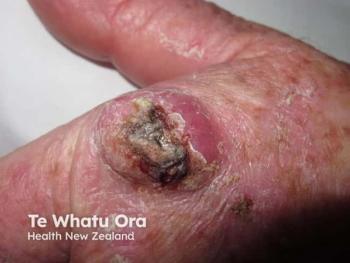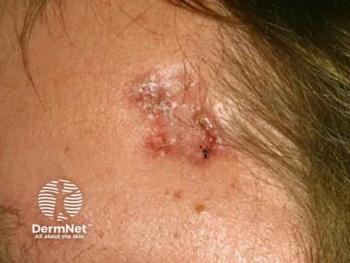
Immunotherapy for advanced squamous cell carcinoma
Immunotherapeutic agents have become an important treatment option for patients with advanced squamous cell carcinoma
Immunotherapy is a quickly evolving field. Patients with advanced cutaneous squamous cell carcinoma (cSCC) are benefitting from the research for a number of other conditions, as novel agents demonstrate efficacy, according to an expert who spoke earlier this year at the ODAC Dermatology, Aesthetic & Surgical Conference, Orlando, Fla. Recent advances in immunotherapy have led to the development of cemiplimab (Libtayo, Regeneron and Sanofi Genzyme), the first drug approved by the U.S. Food and Drug Administration (FDA) for the treatment of locally advanced cutaneous and metastatic squamous cell carcinoma. As high mutational and neoantigenic burdens are believed to be strong predictors of responsiveness to immunotherapy, cutaneous squamous cell carcinoma is expected to be responsive to immune checkpoint inhibitors. Cemiplimab is a programmed death receptor-1 (PD-1) blocking antibody with demonstrated efficacy in treating patients with advanced squamous cell carcinoma, particularly where other treatment modalities have failed.
“For those patients with advanced squamous cell cancers in whom surgical intervention and radiation therapy are not an option or contraindicated, novel immune checkpoint inhibitor agents such as cemiplimab are now available and can have a very positive impact in the quality of life of these patients,” says Desiree Ratner, M.D., clinical professor, Ronald O. Perelman department of dermatology, NYU Skin and Cancer Clinic, New York.
According to Dr. Ratner, cemiplimab is one of the first immunotherapeutic drug available to treat advanced squamous cell carcinoma disease effectively, with response rates of approximately 50%.
“While other immunotherapy drugs in this class, such as pembrolizumab and nivolumab, have the potential to be effective, cemiplimab has been the most studied agent to date in cutaneous squamous cell carcinoma,” she says. “The outcomes achieved with this drug are remarkable and time will tell us about the durability of the results achieved so far.”
Pembrolizumab (Keytruda, Merck), which was approved by the FDA for the treatment of advanced melanoma, has also been approved for first line treatment of head and neck SCC. Now that cemiplimab has received approval, it will likely be the PD-1 inhibitor of choice until studies of other agents are performed that show equivalent effects, Dr. Ratner says.
Not every patient is an ideal candidate for immunotherapy though, as side effects can be significant and sometimes intolerable for some. According to Dr. Ratner, immune response modulators can have a negative impact on patients’ thyroid or pituitary function or can generate other types of immune responses that are unrelated to the tumor. Nevertheless, Dr. Ratner said that the benefit of immunotherapy for these patients is usually much greater when compared to the other treatment options currently available.
Immunosuppressed patients such as those with lymphoma or organ transplant recipients may not be ideal candidates for this type of immunotherapy. Clinicians must therefore carefully weigh all treatment options and the risk/benefit ratio of each patient individually.
“Immunotherapeutic agents have become an important treatment option for patients with advanced squamous cell carcinoma. The next frontier of research will likely be combining immunotherapy with chemotherapy or radiation therapy, bridging treatments and initiating immunotherapy or other agents in those patients who may have developed resistances or failed multiple therapies,” Dr. Ratner says.
Disclosures:
None relevant
Newsletter
Like what you’re reading? Subscribe to Dermatology Times for weekly updates on therapies, innovations, and real-world practice tips.











